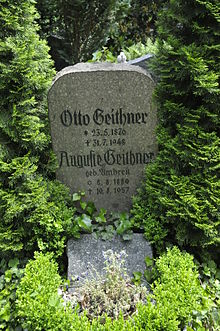Otto Geithner
Otto Geithner (born May 23, 1876 in Merseburg , † July 31, 1948 in Gotha ) was a communist politician and journalist.
Life
Geithner attended from 1882 to 1890, the public school and graduated from 1890 to 1893 a carpentry apprenticeship . After graduation he came into contact with socialist ideas on the waltz , especially in Switzerland, and in 1894 joined the SPD .
From 1899 to 1910 he was chairman of the workers' education school in Berlin, from 1908 to 1910 he was editor of the press office of the SPD party school . Geithner worked full-time for the party: from 1907 as a travel agent for the party publisher, from 1908 as literary editor of the Social Democratic Press Bureau (predecessor of the Social Democratic Press Service ), from 1910 as editor and from 1910 to 1915 editor-in-chief of the Gothaer Volksblatt . From 1912 to 1918 he was a member of the Gotha state parliament and from 1915 to 1918 a soldier.
The burgfriedenspolitik the party majority after the start of World War adverse, made from the Geithner he led regional newspaper one to the ban in February 1915 important organ of the opponents of the war. Geithner took part in meetings of the Internationale Gruppe in March 1915 , later produced illegal leaflets for the Spartakusbund and in 1917 joined the newly founded USPD , which in Gotha and the surrounding area joined large parts of the previous SPD membership.
After the November Revolution and the abolition of the monarchy, Geithner was in fact head of government of the Free State of Saxony-Gotha as chairman of the local council of people's representatives until Wilhelm Bock , Emil Grabow and Adolf Schauder were appointed as people's representatives on November 30, 1918 . During this time he also became chairman of the workers 'and soldiers' council and editor in Gotha.
After the elections in February 1919, in which the USPD achieved an absolute majority in Saxony-Gotha, he belonged to the Gotha state parliament until it was dissolved in 1923. Among other things, Geithner ensured social reforms such as the introduction of the eight-hour day .
During the Kapp Putsch in 1920 he was a member of the "Battle Management for the Liberation of Gotha" from the Reich Defense Units.
After the unification of the Thuringian states to form the state of Thuringia , he also moved into the local state parliament in May 1920, to which he belonged until 1927. With the majority of the local USPD, Geithner participated in the merger with the KPD to form the VKPD at the end of 1920 , whose "central committee" he was a member of the Unification Party Congress as a representative of the Thuringian party district until 1923, and he continued to head the KPD daily newspaper Thüringer Volksblatt .
Geithner, who belonged to the "left" wing around Ruth Fischer and Arkadi Maslow , then to the "ultra-left" wing around Iwan Katz in the KPD, was one of the first prominent internal party critics, who in March 1926 left the leadership of Ernst Thälmann in office from 1925 Party was excluded. Geithner founded the Communist Working Group (KAG) together with the two Thuringian state parliament members Agnes Schmidt and Hans Schreyer, who had also left the KPD , but failed to make it into parliament with 0.46% of the votes in the 1927 state elections. Geithner and his group worked together with Karl Korsch for a while and joined the SAPD in the final phase of the Weimar Republic .
In 1933 Geithner participated in the resistance against National Socialism . Geithner was arrested in 1935 to three and a half years prison sentenced and after serving the sentence in October 1938 in the Buchenwald concentration camp abducted, where he was detained until the liberation in April 1945th After returning to Gotha, he joined the KPD and in 1946 became a member of the SED , worked for the Thuringian People's Newspaper and from 1946 until his death he was the age president of the Gotha city council and director of the library at Friedenstein Castle .
Others
After his death, Geithner was cremated in the Gotha crematorium . His grave can be found in the Gotha main cemetery (Urnenplatz 205 a).
Honors
- A street in Gotha has been named after Otto Geithner since 1977.
- Laying of a stumbling block for Otto Geithner on Aug 4, 2014 in Gotha, Oststr. 40
literature
- Katja Vogel: From Otto Geithner's estate. In: Gothaisches Museum-Jahrbuch. Vol. 6, 2003, pp. 179-194.
- Steffen Kachel : A red-red special path? Social Democrats and Communists in Thuringia 1919 to 1949 (= publications of the Historical Commission for Thuringia, small series. Vol. 29). P. 550.
- Geithner, Otto. In: Hermann Weber , Andreas Herbst : German Communists. Biographisches Handbuch 1918 to 1945. 2nd, revised and greatly expanded edition. Dietz, Berlin 2008, ISBN 978-3-320-02130-6 .
Individual evidence and references
- ↑ a b c Helmut Roob and Günter Scheffler: Gothaer personalities. 2nd Edition. Rhino-Verlag, Arnstadt / Weimar 2006, ISBN 3-932081-37-4 .
- ↑ Geithner, Otto. In: Hermann Weber , Andreas Herbst : German Communists. Biographisches Handbuch 1918 to 1945. 2nd, revised and greatly expanded edition. Dietz, Berlin 2008, ISBN 978-3-320-02130-6 .
| personal data | |
|---|---|
| SURNAME | Geithner, Otto |
| BRIEF DESCRIPTION | German communist politician (SPD, USPD, VKPD, SAPD, SED) and journalist |
| DATE OF BIRTH | May 23, 1876 |
| PLACE OF BIRTH | Merseburg |
| DATE OF DEATH | July 31, 1948 |
| Place of death | Gotha |
